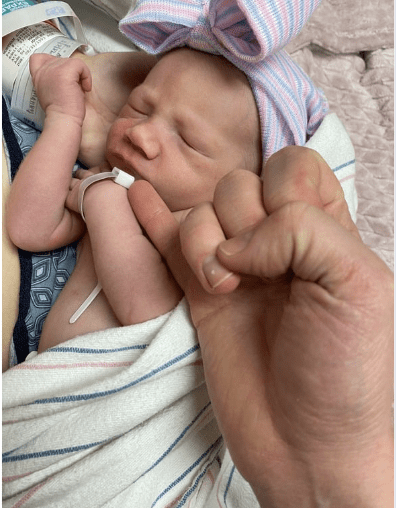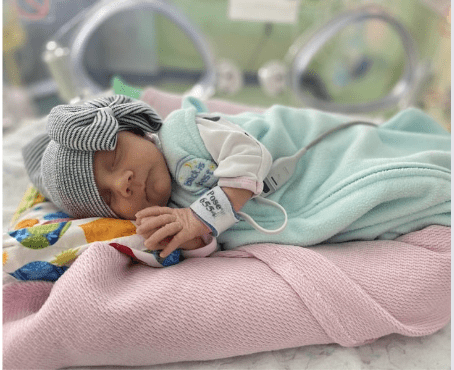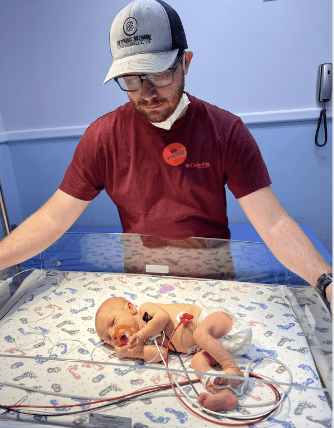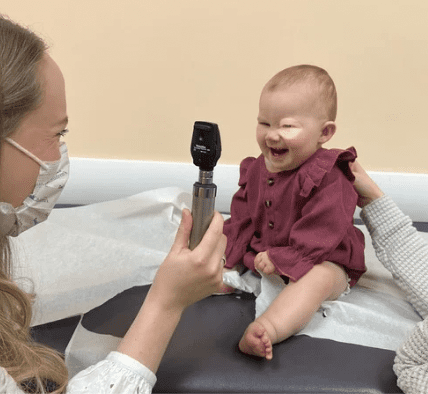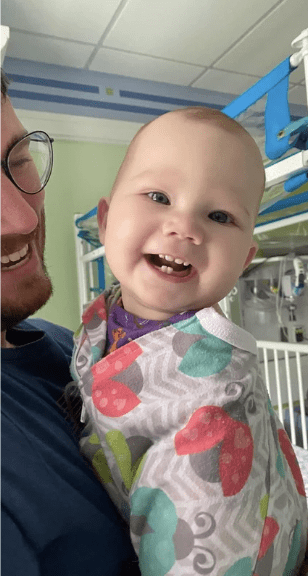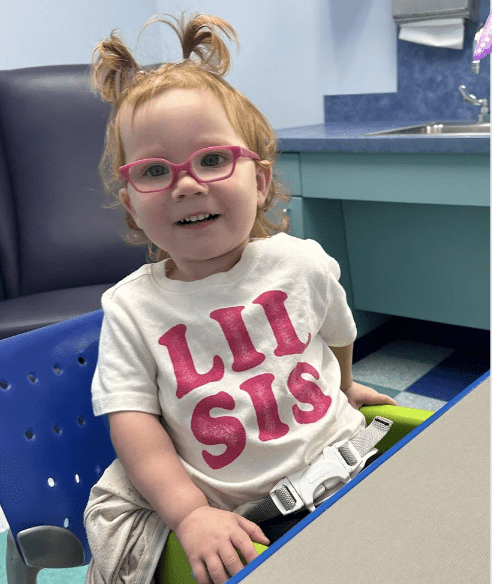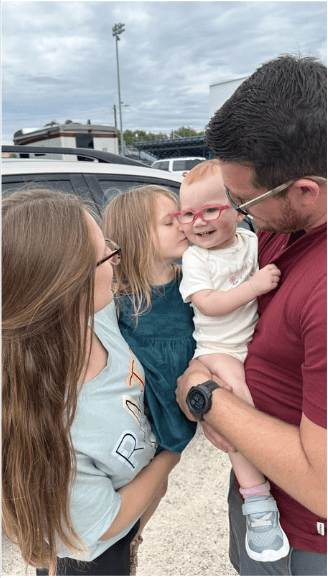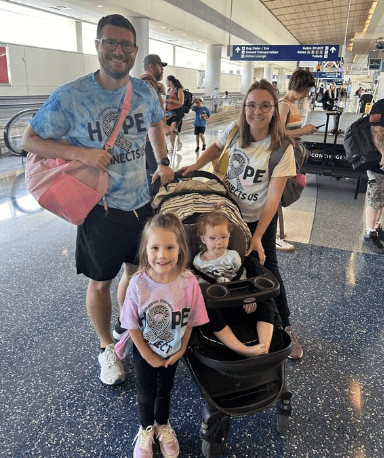
Marley from Texas
We found out that we were pregnant with Marlene “Marley” right around 3 weeks. I remember telling my husband, Dalton, around 5 weeks that I wanted to wait to tell other people. I had a feeling that I might miscarry or that something could be wrong; not because of anything physical, just an inner intuition that I felt. I could hardly explain it. Everything ended up being fine, and I had an overall easy pregnancy, similar to my first pregnancy with Marlene’s older sister, Addy. About two months before Marley was due, her ultrasound showed that she had gone from the overall 10th percentile in all areas, down to the 3rd percentile in her tummy area. This led to a diagnosis of IUGR (Intrauterine Growth Restriction) and required weekly ultrasounds. She did jump back up to the 8th percentile in her tummy, but we ultimately decided to take her via planned c-section at 37 weeks and 5 days. My doctor decided at that point that she would get more nutrition outside of the womb than in. We agreed, and ended up birthing a beautiful and healthy 5lb 12oz baby girl! She was tiny, but looked great.
For the first two weeks of life, Marley’s body temperature fluctuated. She lived on a heating pad, and in everyone’s arms, all bundled up. Her “Pops” held her on the heating pad for 10 days, and “Lolli” chased big sister around. Her “Dandie” and “Poppy” saved us with snacks to refuel and help in any area we needed! We couldn’t have done those first two weeks without any of them.
We were at the pediatrician's office every few days to check her weight, temperature, etc, and we couldn’t have asked for a better or more supportive doctor and group of ladies in the office. At this point, we all thought she was just tiny and needed to get some more fat on her bones to maintain her temperature. She nursed great from the day she was born, so eating wasn’t a struggle. We believed that at this rate, she would eventually put on more weight and maintain her temperature on her own.
At 14 days old, we went for a visit with her pediatrician and left with a plan to continue warming her up as needed, and monitoring things closely. But that same evening, we got a call from the pediatrician. We initially thought she was calling just to check on us, but the conversation quickly turned. She told us that a geneticist from Cook Children’s Hospital had called her, and while Marley’s first newborn screen wasn’t flagged as out-of-range, her secondary screen showed some elevations. She went on to say that after chatting with the geneticist, they both agreed that there wasn’t a need to rush her to the ER, but that we would need to take her in the next day for bloodwork. I remember hearing “This could be a fluke.”
My husband Dalton and I felt strongly that something could be wrong with Marley, but truly had no idea what would unfold in the days ahead. We prayed for that fluke; that we were right in thinking that she just needed more time to put on weight and praying that time was all that our baby girl needed. We both agreed that there was no reason to rush, and that we should spend one more night together and take her in for labs in the morning.
About an hour after we got off the phone with her doctor, Marley’s temperature was down to 93°, and she was obtunded (worse than lethargic). Up to that point, she had been alert and responsive. We immediately warmed her back up on the heating pad as we grabbed what we could, and rushed to Cook Children’s, our closest children's hospital. We got there at 8 pm and by 8:16 she was under a warmer, with all kinds of tests being run. I am still amazed by how quickly and efficiently the team worked. This is where our timeline to diagnosis started.
Select the arrows to preview the the journal posts!
Key Moment!
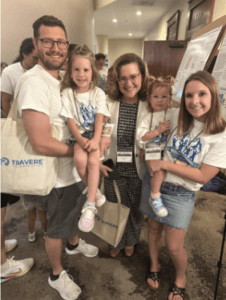 We started educating our immediate family and friends by sharing information. We posted on Facebook, and had countless conversations to explain CblC, what medications Marley needs daily, and how to give them. We have a document that has everything written out, just in case someone needs to reference it, and we adjust it as her dosages change. I like to call it our cheat sheet, and I've found that the more detail I gave, the less stressful the regimen became. Early on we involved our family members in Marley’s care. We had a few of them practice giving her shots after watching us. We felt so much relief that someone else could give her the injection, if for some reason we couldn’t.
We started educating our immediate family and friends by sharing information. We posted on Facebook, and had countless conversations to explain CblC, what medications Marley needs daily, and how to give them. We have a document that has everything written out, just in case someone needs to reference it, and we adjust it as her dosages change. I like to call it our cheat sheet, and I've found that the more detail I gave, the less stressful the regimen became. Early on we involved our family members in Marley’s care. We had a few of them practice giving her shots after watching us. We felt so much relief that someone else could give her the injection, if for some reason we couldn’t.
We enrolled Marley in daycare at 5 months old and began teaching the staff about her medications. While it was hard to let go of control of always having her under our care, it was so freeing when to resume “normal” life and receive help from others.
I will say, the worry never goes away. We worry about how Marley is doing compared to peers. We worry that she will be perceived as “difficult” as she does have more needs than other kids her age. But her teachers are always reassuring us that she is amazing, and not a burden, and it means a lot to us. When you have a child with complex medical needs, you want to protect them in any way you can. We really lean into our faith and try to never project our fears onto our kids.
My husband and I find so much value in learning, advocating, teaching, and just being there for other families in any way we can. This journey is not something anyone should try to navigate alone. We feel strongly that Marley was given her rare disorder for a reason greater than we’ll ever understand. God had a plan when he chose her for this and chose our family to navigate it alongside her. As crazy as it is, we are thankful for the growth it has allowed us to have as a family. We appreciate life in a way we didn’t know how to before.
While it can be so devastating and difficult at times, know that if you are reading our story and personally navigating the same or similar diagnosis, you are not alone! It does get easier with time. We are a little less than 2 ½ years in, and while it feels like we’ve learned more information than you should ever learn without a medical degree, the hardest parts of being newly diagnosed have subsided. We love connecting with new families and feel like it is our purpose to serve others, until Marley is old enough to one day connect with you herself!
personally navigating the same or similar diagnosis, you are not alone! It does get easier with time. We are a little less than 2 ½ years in, and while it feels like we’ve learned more information than you should ever learn without a medical degree, the hardest parts of being newly diagnosed have subsided. We love connecting with new families and feel like it is our purpose to serve others, until Marley is old enough to one day connect with you herself!
Our greatest hope is that medication (high dose hydroxocobalamin specifically) can be easily accessible one day. We also hope that families will continue to fundraise for HCU/MMA/Cobalamin Disorders. As a rare disease community, everything we do to raise funds for research will help future generations.
